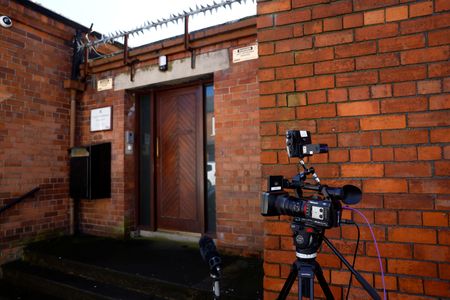By Amanda Ferguson
BELFAST (Reuters) – The British government on Monday rejected an attempt to trigger the “Stormont Brake”, angering Northern Ireland unionists who sought to use the post-Brexit emergency mechanism to stop the application of a piece of EU law in the British-run region.
All unionist lawmakers in the Belfast regional assembly, each of whom is committed to keeping the province in the United Kingdom, asked to trigger the mechanism for the first time last month for EU rules on the packaging and labelling of chemicals.
Northern Ireland remained in the EU single market for goods when the rest of the UK left the European Union. The aim was to keep open the politically sensitive border with EU-member Ireland, but this required specific arrangements to limit frictions in the province’s trade with Britain across the Irish Sea.
Under the February 2023 Windsor Framework, London must judge if an amendment to EU law would significantly impact everyday life in Northern Ireland if enough local lawmakers ask it to do so under the “Stormont Brake”.
Britain’s minister for the region Hilary Benn said unionist arguments that the changes, such as differing font sizes and spacing, amounted to a “significant divergence” with the rest of the United Kingdom did not meet the threshold for action.
He said London would conduct a public consultation on whether it should apply a consistent chemical labelling regime across the UK and that this was a “direct result” of the scrutiny from Northern Irish politicians.
Democratic Unionist Party (DUP) leader Gavin Robinson said the decision was a “grave mistake” and that London needed to start standing up for Northern Ireland “rather than surrendering to EU diktats”.
The smaller and more hardline Traditional Unionist Voice (TUV) party urged the DUP to again quit the devolved government in protest, as the region’s largest pro-British party did from 2022 to 2024 over the post-Brexit trade rules.
“Can the DUP continue in the Executive now that the Stormont Brake has been shown to be useless? To carry on propping up unabated EU colonial rule should not be an option for any unionist,” TUV leader Jim Allister said in a statement.
A cross-party committee in the Northern Irish assembly that scrutinises relevant EU legislation was unable to reach a view last month on whether the rules would have a significant impact on everyday life.
(Reproting by Amanda Ferguson, additional reporting by Padraic Halpin and Conor Humphries in Dublin; Editing by Kevin Liffey and Alex Richardson)








